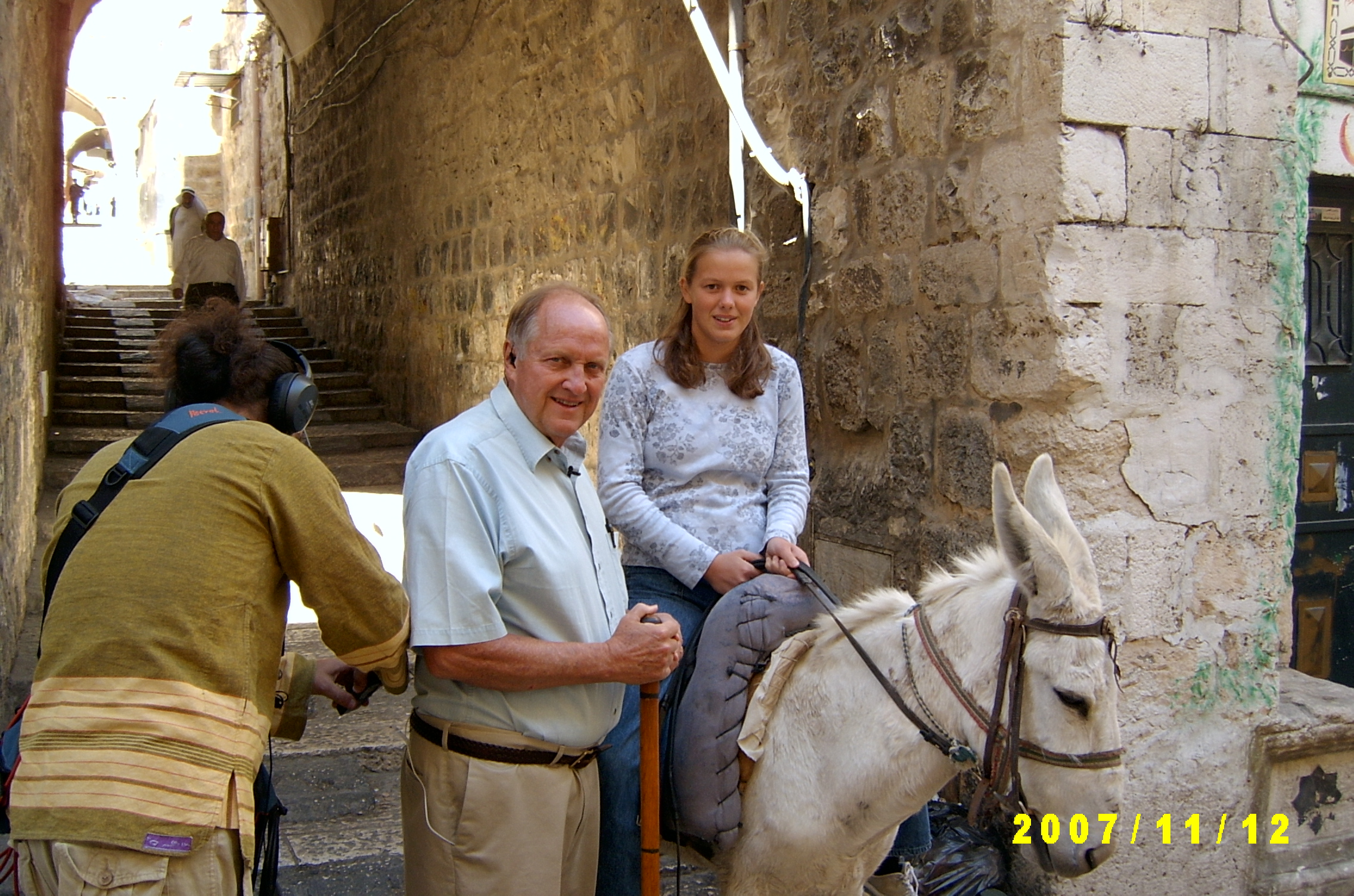17 Things We Learn From Church History
Ken Curtis's words of wisdom from the '99 CEVMA conference | Post by Michelle Curtis

Michelle Curtis with her grandfather, Ken Curtis, while filming Reflections on The Lord's Prayer in Israel. | Personal Photo
While we were working on CH 144, Christian History in Images, my dad came across a folder full of my grandfather’s notes on “what we learn from church history.” In that folder, I found my Poppop’s notes from a talk he gave over 20 years ago at the Christian European Visual Media Association (CEVMA) conference in 1999. In his presentation he named 17 things we learn from church history (it appears that he chose 17 because it was the 17th annual CEVMA conference).
I read through this list as my dad and I worked on our note from the publisher, and I was struck by how studying church history made my Poppop wise. Studying history helped him to take the long-view of how God works through time instead of getting lost in the current crisis or controversy. It made him humble, recognizing that he cannot see everything God is doing. And it gave him hope, remembering that nothing has prevailed against God’s church in the past and God will continue to sustain the church in our day and the years to come.
I want to share his list of 17 things with you in hope that they will encourage you to continue learning about our history and to share it with others. And when people ask you, why should I bother with history?, I hope my Poppop’s insights will give you a place to start your answer.
Why study church history? Here’s what our founder, Ken Curtis, said:
- God works over centuries—we can’t see the fullness of what God is up to in a single lifetime.
- God has more time than we would expect or want. He is in no hurry—Christians have been expecting the second coming from NT days up to the present, but God is doing far more than anyone expected to prepare the bride.
- The very presence of a vital spiritual church inevitably evokes opposition—persecution, misunderstanding, distortion, false accusation.
- When the church appears vulnerable and weak, it may be at its strongest. When it appears strong and powerful, it may be at its weakest.
- Neglected areas in church and theology will produce reactions and correctives: monasticism, Pentecostals, Anabaptists, reform movements who exaggerate their point in order to be heard.
- Heresy usually has some strong elements of truth—it is a catalyst to define doctrine.
- Boundaries drawn to say who’s in and who’s out may be important, but they can be dangerous and deceptive—God’s boundaries are probably a lot different from our own. Some of my earlier convictions about who to include or exclude, I consider now to be clearly sinful.
- Many of God’s most blessed and gifted servants did not really get to do what they thought they most wanted to do. Augustine and Luther wanted a quiet life of monastery and Calvin a quiet life of academia; it’s not so important to get what we think we want.
- Some of the most influential leadership has been exercised from prison: Paul, Bunyan’s Pilgrim’s Progress, Bonhoeffer, Martin Luther King Jr., and Alexander Solzhenitsyn.
- The dark night of the soul is not a disease—be prepared for it.
- The Church—like individuals—is sustained only by grace, not by our own goodness; and it is capable of great evil.
- The “Super Orthodox Brethren” can unwittingly undermine the very gospel they seek to protect and preserve. There is a crucial difference between possessing the Gospel and being possessed by the gospel.
- The church itself produced some of its most virulent opponents. Look at Julian, nephew of Constantine, Nietzche, son of a Lutheran pastor, Stalin, a former seminary student, Playboy’s Hefner, son of a Methodist pastor.
- There are special moments of momentum and opportunity given to peoples for the gospel as it continues to move from West to East.
- Repentance for the sins of our Christian past is essential (e.g. Crusades, slavery). It is the way we honor those who gave us the gospel.
- The greatest impact has often been by simple, humble believers.
- There is no objection that can be raised against the church, no assault mounted, whether physical persecution, intellectual attack, ridicule, marginalization, or whatever, that has not already been raised and attempted before and which the church has faced and survived. The gates of hell have not prevailed against her. They will not prevail.
I’ve found that reading and editing Christian History magazine has helped me to understand these insights more deeply. And I hope it's made me wiser, more humble, and more hopeful, just like my Poppop.
Michelle Curtis is a contributing editor of Christian History and co-pastor of Ambler Mennonite Church. She is also the granddaughter of CHI founder, Ken Curtis. Michelle and her husband, Jacob, are expecting their first child in September 2022.



